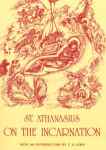There are three good reasons to read this edition of Athanasius’On the Incarnation.
First, the Introduction by C. S. Lewis is worth the price of the book. “There is a strange idea abroad that in every subject the ancient books should be read only by professionals,” he writes, “and that the amateur should content himself with the modern books.” He goes on to give reasons why that “strange idea” is a mistake, as well as to make the case for the importance of reading old books. “The only palliative [to modern prejudices] is to keep the clean sea breeze of the centuries blowing through our minds, and this can be done only by reading old books.” And, of course, he praises the translation itself: “I do not think the reader will find here any of that sawdusty quality which is so common in modern renderings from the ancient languages.”
The second reason to read this edition of On the Incarnationis the argument Athanasius makes. Athanasius is the bishop of Alexandria who led the fight for Nicene Christianity against the Arian heresy throughout the middle of the fourth century. It is from that fight he earned the moniker Athanasius contra mundum, “Athanasius against the world.” But On the Incarnationwas written prior to Nicea. It summarizes orthodox Christian teaching regarding the person and work of Christ. It breaks no ground theologically, which is why it is so valuable. It lays out clearly and compellingly what Christians continue to believe about the nature and purpose of Christ’s Incarnation. The only false notes I detected in the overall argument were when Athanasius offered a “refutation” of the Jews (Chapter VI) and Gentile polytheists (Chapters VII and VIII). Especially with regard to Jews, Athanasius’ refutation seemed directed at a Christian caricature of Jews rather than at fourth-century Jews themselves. And his refutation of Gentile polytheism in Chapter VIII, wherein he cited the decline of paganism and the rise of orthodoxy as proof of the latter, was too triumphalistic. Today, Alexandria is a majority-Muslim city. That doesn’t prove the truth of Islam.
The third reason to read this edition is its inclusion of the Appendix, “The Letter of St. Athanasius to Marcellinus on the Interpretation of the Psalms.” I read the Psalms daily, and I resonated with nearly every word Athanasius offered in praise of routine Psalm-reading. He wrote: “Son, all the books of Scripture, both the Old Testament and the New, are inspired by God and useful for instruction, as the Apostle says; but to those who really study it the Psalter yields especial treasure.” Yes, it does.
So, five stars for this edition of On the Incarnation.
 Book Reviewed
Book Reviewed
St. Athanasius On the Incarnation: The Treatise De Incarnatione Verbi Dei, trans. and ed. by a Religious of C.S.M.V, with an Introduction by C. S. Lewis(Crestwood, NY: St. Vladimir’s Seminary Press, 1993).
P.S. If you found my review helpful, please vote “Yes” on my Amazon.com review page.
P.P.S. The edition I reviewed is no longer in print. St. Vladimir’s Seminary Press newer editionof On the Incarnationincludes Lewis’ Introduction with a new translation of the work by John Behr. It does not include Athanasius’ letter to Marcellinus. It is also available with the original Greek textand new translation on facing pages.

